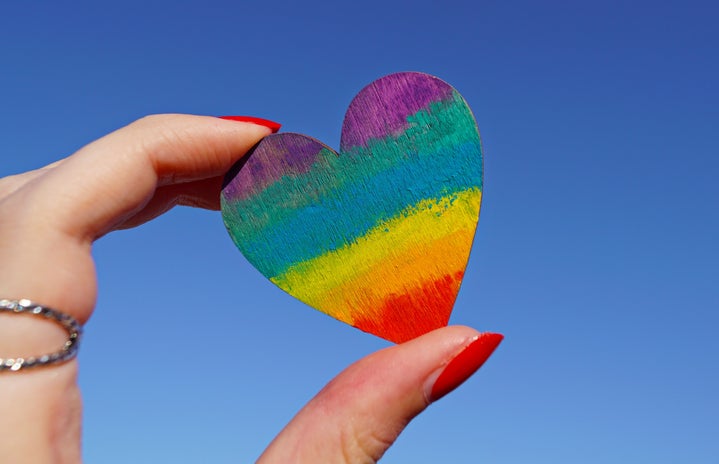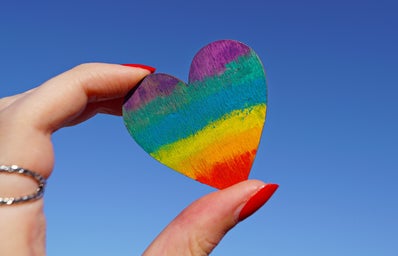The history of queer media is a very rocky one full of homophobia, queer baiting, and buried storylines. It’s even more difficult for queer shows and movies targeted at a younger audience, as the showrunners don’t want to upset the more conservative side of their viewership: the parents that don’t want their kids exposed to gay characters. Because of these factors, it’s been a long road to where healthy and accepting queer stories have become more popular in mainstream TV. If we go back to the early 2000s, and even the 2010s, we’ll get shows like Dawson’s Creek and Pretty Little Liars who, by their standards, were taking fairly big risks in having their characters come out as gay. Of course, older shows had to take the first steps in order for newer shows to have an easier time handling coming out stories. While I don’t believe these old shows necessarily mishandled their respective coming out scenes for their queer characters, they do serve as examples of how far we’ve come given that these queer storylines showed the more difficult and unaccepting scenarios for queer people rather than a happier one. They show the queer character first going through a lot of pain before they reach a place of acceptance, especially from their parents. Looking at Dawson’s Creek, their gay character had a very sad and disapproving coming out between him and his father where his father refused to accept it. Similarly with Pretty Little Liars, one parent was accepting while the other took longer to come around. With Pretty Little Liars being made a few years after Dawson’s Creek, it makes sense that, through the progression of the LGBTQ+ community finding acceptance from the public during the 2010s, that Pretty Little Liars would be able to show more accepting parents. This brings us to more recent years where we got movies such as Love, Simon and one of the newest releases for queer love stories, the new Netflix show: Heartstopper. Warning: Spoilers Ahead!
Heartstopper is an unapologetically queer show. It’s made by queer people for queer people, and the focus never shifts to a heteronormative viewpoint. The main love story is between two male characters, Nick and Charlie. Charlie starts the show comfortable in his sexuality: he is already out to his family, as well as his school, though not of his own volition. Despite being outed, we still get his perspective as one of the only out queer people at his school. We also see how his family treats him, or more accurately, how they don’t treat him differently. They’re all very accepting, with his dad worrying about him more because of bullies, and with his sister always trying to be there for him through his struggles. None of them ever insinuating that they have a problem with him being gay. Charlie’s family and friends offer the audience a casual acceptance of gay people. That queer people can simply exist and be accepted by those that matter to them. Even though Charlie does have to face homophobia at his school, his character doesn’t play into stereotypes of gay people having to live through constant tragic circumstances. Of course there’s a lot of bigots and tragedy and a general lack of acceptance towards queer people but an important aspect to normalizing the existence of queer people is to show them being casually open about who they are.
Nick’s character is on a different path. He doesn’t know he’s anything but straight when the series starts. He’d never thought about having any attraction to boys, and had simply assumed he was only attracted to girls because that’s all he’d experienced so far. It’s only when Nick meets Charlie that he begins to think more about his sexuality and realizes that he’s bisexual. He doesn’t realize it right away, feeling understandably confused as he tries to fit himself into the gay vs straight dichotomy, before admitting to himself that he likes both. The point in Nick’s story that I wanted to highlight is actually the very end when he comes out to his mom. The narrative allows Nick to figure himself out on his own and, through his relationship with Charlie, drop hints throughout the season that his mom might have an idea of what he’s going through, but she never tries to pry before he’s ready to tell her. The final scene between Nick and his mom is a very heartwarming and extremely supportive moment where Nick tells his mom that Charlie is his boyfriend and that he likes both boys and girls. She tells him that he shouldn’t feel pressured to say that he likes girls if he doesn’t, but he tells her he’s bisexual. She accepts him right away and then goes further and apologizes to him, saying “I’m sorry if I ever made you feel like you couldn’t tell me that”. That line felt reminiscent of the movie Love, Simon from 2018. In that movie we see Simon talking to his dad after he’d come out to his family in a very emotional scene where Simon’s dad apologizes to him saying “I shouldn’t have missed it.” The way these parents treat the coming out of their queer children, putting the onus on themselves, rather than their kids, is so important to witness. It’s a stark opposition to how previous parental characters, such as those on Dawson’s Creek or Pretty Little Liars, reacted to their kids. There’s no wrong way to come out when it’s on your own terms, but there are plenty of wrong ways to react to someone coming out to you. We can see how, through the continued efforts of creators to tell more diverse queer stories, that there’s been both big and subtle changes in how queer characters are portrayed and treated.
There have been countless stories in media that have queer characters reassuring their parents that they’re still the same person, or feeling guilty for coming out, or kids being outright disowned by their family. These negative tropes attempt to show the reality of queer people coming out to an unaccepting world, but it also reinforces the idea that the queer person should apologize for who they are and take it upon themselves to make those around them more comfortable with their queerness when that shouldn’t be their responsibility. Seeing positive queer stories, particularly ones aimed at young kids who might be struggling with their own sexuality, helps those watching understand that it’s not on them to make others comfortable by hiding who they are. Heartstopper taps into that and gives a look at a healthy dynamic between parents and their kids. It shows how easy it is for a parent to be what their child needs and the show itself is something that a lot of kids need as well.

